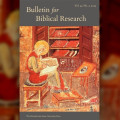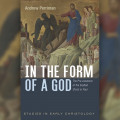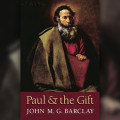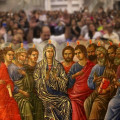All content
The latest issue of The Bulletin for Biblical Research (33.3, 2023) has my article on the subjection of the creature or created material to the futility of idolatry. It’s an argument that I made here in outline a few years ago. You need a… ()
In his 2016 NIGTC commentary on Romans, Richard Longenecker provides a summary of what he regards as the key themes that Paul “considered distinctive to his own proclamation of the Christian gospel” (1045-46). They strike me, for the most part, as… ( | 4 comments)
The way I see it, Paul’s letter to the Romans is like a stage with three vast backdrop cloths hanging one in front of the other.
The largest cloth depicts the creational presuppositions of the letter: God is the creator of all things and… ( | 1 comment)
Romans 14 is usually read as a new section dealing with disagreements within the community over such matters as diet and observance of holy days. There is, however, an immediate and decisive eschatological aspect to the discussion:
Who are you… ()
Following the exuberant exclamation and doxology of Romans 11:33-36, Paul gets to the practical consequences of his gospel for the saints in Rome. This is where he outlines the nature of the “obedience” required of those from among the nations who… ()
What is going on here? Is this a tolerable way for Christians to behave? Should we all be doing it? And before you ask, no, it has nothing to do with helping them to keep the fire going.
The larger concern in this section of Romans is how the… ()
Paul’s letter to the Romans is held together by a prophetic narrative. God has made Jesus Son of God in power by his resurrection from the dead, and he will one day rule the nations. This means that there will be “wrath” against the idolatrous… ()
Romans 7:1-8:39The argument about the status of the Law of Moses in this critical period of eschatological crisis continues. Paul speaks to “those who know the Law,” but now he seems to be addressing Jewish believers, who “have died to… ( | 4 comments)
I recently did a long and enjoyable interview with Sean Finnegan, talking about my book In the Form of a God: The Pre-existence of the Exalted Christ in Paul. Sean is lead pastor of Living Hope Community Church near Albany, New York, and… ( | 2 comments)
Romans 5:1-6:23
Let’s remind ourselves, first, that in these chapters Paul has been recapitulating a dialogue with the Jews of the diaspora, for the most part about the Jews of the diaspora. They have failed to provide a… ( | 3 comments)
One obvious retort to the argument that Paul allows for the existence of unbelieving righteous Gentiles who will be justified on the basis of their good deeds on the day of God’s wrath is that he goes on to state emphatically, quoting the… ( | 1 comment)
I have finally got round to reading John Barclay’s highly esteemed Paul and the Gift, and he almost persuaded me to change my mind about the identity of the Gentiles who do not have the Law but do what the law requires (Rom. 2:14).I… ()
Romans 3:1-4:25
As an apostle of the gospel of God concerning his Son, Paul has argued so far that the Greek-Roman world, as he has encountered it in the course of his missionary journeys from Antioch to Athens, faces a day of God’s wrath or… ()
Romans 1:19-2:29
Why does good news need to be heard regarding the “power of God for salvation”? Why does God have to justify himself by ensuring that the righteous person lives because of faith or faithfulness?
The reason is that “the… ( | 6 comments)
Jesus tells a rather disturbing story about the judgment of his people at the end of the age of second temple Judaism. This is my very functional translation:
Again, the kingdom of the heavens is like a dragnet (sagēnēi) thrown into… ()
Romans 1:1-18
Paul, apostle of the Lord Jesus Christ (1:1-7)
Paul introduces himself to those in Rome who are “called to be saints” as a slave of Christ and an apostle, “set apart for the gospel of God.”
The “gospel” is the… ( | 7 comments)
I take several chapters in my book In the Form of a God: The Pre-existence of the Exalted Christ in Paul to argue that in the first part of the Christ encomium in Philippians 2:6-11 the direction of travel is ontologically flat:… ( | 3 comments)
Christians who think that it is right and good to maintain a form a patriarchy, at least in church and home, will often argue that by naming the woman Adam exercises or asserts an innate, creational authority over her that is not abrogated… ( | 2 comments)
John says that Isaiah saw the glory of Jesus (Jn. 12:41). Is this a reference back to the “glory” of God that Isaiah saw in the temple? Or is it something else? Well, I’m going to say that it was something else, not because I’m anti-trinitarian but… ()
I have been working through Craig Keener’s Spirit Hermeneutics: Reading Scripture in Light of Pentecost (2016) to prepare some teaching materials on Pentecostal hermeneutics. It’s a fairly casual read, so far at least. I could really do… ()










Recent discussion